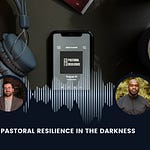Resilience in Church Planting: Key Insights from Sihle Xulu
In this episode of "Fueled Pastoral Resilience," Dr. Raphael Mnkandhla spoke with Pastor Sihle Xulu from Renewal Fellowship in Johannesburg, South Africa. Sihle shared valuable insights on church planting, personal faith, and resilience in ministry. Here are the key highlights:
Sihle’s Background and Calling:
Family and Early Life: Sihle grew up in Durban, South Africa, in a Christian family with a single mother. He was surrounded by uncles involved in both politics and the church. He initially rebelled against the church during high school but returned to his faith in university.
Conversion and Call to Ministry: Sihle’s return to faith was sparked by a friend’s persistent invitations to church. He experienced a clear gospel message that led to his conversion. His call to ministry evolved from a hunger for the Word to a desire to share and explain it to others.
Renewal Fellowship: Sihle leads Renewal Fellowship, a church planted four years ago in Johannesburg. He finds joy in witnessing God's work through the congregation.
Key Components of Resilience in Ministry:
"Drinking What You Feed People": Sihle emphasized the Zulu cultural tradition of drinking a beverage first before offering it to guests, symbolizing taking out any potential "poison." This translates to ministry by personally living out the truths he preaches.
Word and Prayer: Non-negotiables for Sihle include devotion to the Word of God and prayer. He believes these are essential for both personal spiritual health and effective ministry. He quoted 1 Timothy 4, emphasizing watching one's life and doctrine.
Heavenly Wisdom: Drawing from Charles Bridges' "Christian Ministry," Sihle highlighted that earthly wisdom comes from study, while heavenly wisdom comes from prayer and the Word.
Immersion in the Gospel: Understanding that the gospel is not just for salvation but a dynamic force for daily life is crucial. Sihle stresses the need to continuously immerse oneself in the gospel.
Christian First, Pastor Second: He reminds himself that he is a Christian first, then a pastor, and needs the daily rhythms of a Christian life, which include the gospel.
Joy in Adoption, Not Job: Sihle recognizes the danger of tying his joy to his job (ministry) rather than his adoption as a child of God. He emphasizes rejoicing that his name is written in heaven (Luke 10:20).
Balance Between Applause of People and Applause of God: He shared experiences of feeling successful in ministry while privately struggling, emphasizing the need to prioritize God's approval over human applause.
Gospel in Mountaintops and Valleys: Sihle finds he needs the gospel more on mountaintops (times of success) than in valleys (times of struggle). He recognizes the danger of thinking God approves of unrepentant living because of outward success.
Sources of Fuel and Encouragement:
Bible: Sihle turns to Paul's pastoral epistles (1 Timothy), Galatians, and the teachings of Jesus. He emphasizes 1 Timothy 4’s focus on life and doctrine, and Galatians as “Gospel 101”.
Living Influence: Pastor Ray Ortlund, particularly his book "The Gospel," has been a significant influence. Sihle admires Ortlund’s life, ministry, joy, and commitment to reaching those at the bottom.
Dead Theologians: Augustine's "Confessions" and J.I. Packer’s "Knowing God" have been influential. Augustine's emphasis on joy and Packer’s distinction between knowing about God and knowing God personally resonate with Sihle.
Resilience and Identity:
Identity in Christ: Sihle emphasizes finding his identity in Christ as a child of God, especially during both successes and failures. His justification is in Christ alone, not in ministry outcomes.
Wounds and Blind Spots: Recognizing that unaddressed personal wounds can sabotage ministry, Sihle underscores the importance of dealing with them. He appreciates Augustine’s exploration of deeper motivations behind actions.
Key Takeaway:
Sihle Xulu’s insights highlight that resilience in church planting and ministry comes from a deep commitment to the Word and prayer, an unwavering focus on the gospel, a clear understanding of one’s identity in Christ, and a prioritization of God’s approval over human recognition. By "drinking what you feed people" and remaining grounded in these truths, pastors can endure and thrive in their calling.
Notes generated from transcript by Gemini















Share this post